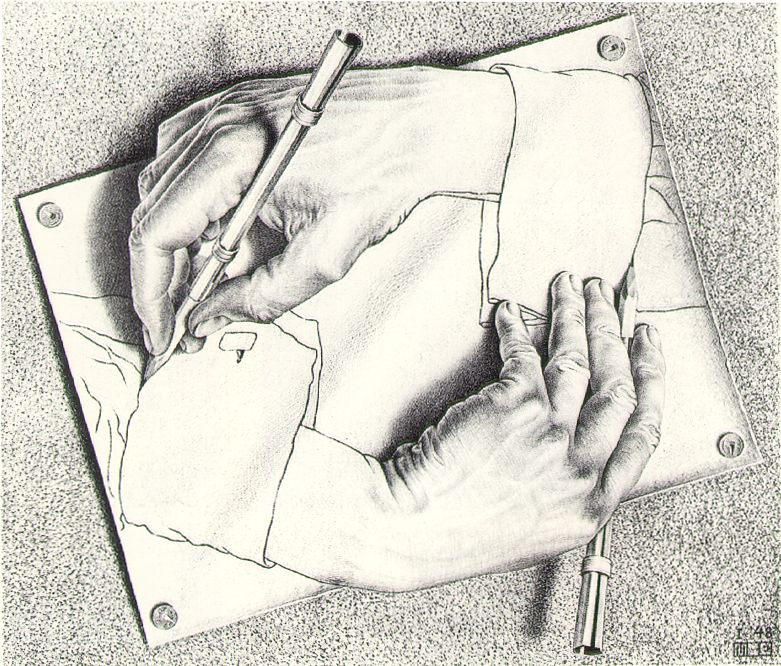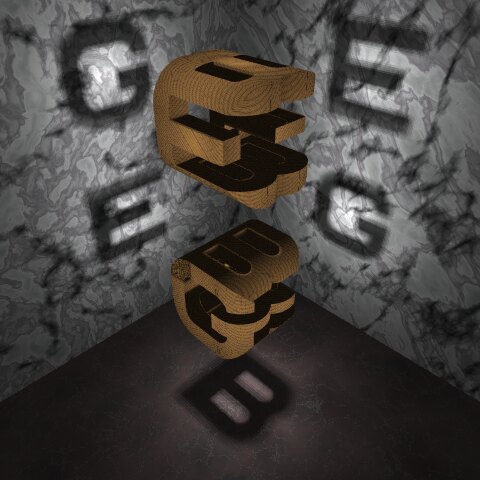|
Gödel, Escher, Bach:
a literary approach to minds and machines
~ Symbolic Systems 11si, a student-initiated
course for Spring 2005 ~
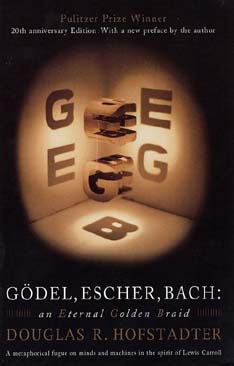 |
Student Instructor: Brendan
O'Connor - brendano@stanford.edu
Faculty Sponsor: Maggie Johnson -
johnson@cs.stanford.edu
Fridays, 11:00-11:50 am,
Building-Room 60-62C, 1 unit Credit/No Credit
Can computer science have anything to do with art,
music, or philosophy? Douglas Hofstadter's Pulitzer-winning
Gödel, Escher, Bach freely integrates poetry,
fugues, Zen, Platonic dialogues and metaphorical puns, all to
pursue the thorny questions of artificial intelligence and the
human mind. This class will take a playful approach to
understand these ideas and literary technique through
discussion, analysis, and performance. Will cover concepts in
computational theory, mathematical logic, and philosophy of the
mind. Students from all disciplines encouraged to join!
We will read the book straight through with weekly
discussions to clarify, understand, and explore the concepts and
issues raised. Occasional speakers and events.
|
|
Questions about the course
Can you explain with any more detail, what the course is about?
The great bulk of the course is mostly just about reading through Gödel,
Escher, Bach, which "delves, and not just superficially, into so many
motley topics." Try taking a look at it in the bookstore.
What are the prerequisites?
None! Knowledge of some basic concepts in logic or computer science
may be helpful, but we defintely will be covering these technical points
of Hofstadter's argument during class. Much of the text is, however,
devoted to explaining mathematical arguments.
In many ways, the book functions as a
literary introduction to logic and computational theory.
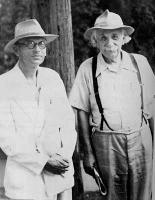
|
Kurt Gödel avec un paysan non identifié
Taking a break from upending all mathematics.
|
The
Syllabus!
Also in .doc form.
Note that the reading
schedule may later change from there; see the Schedule below.
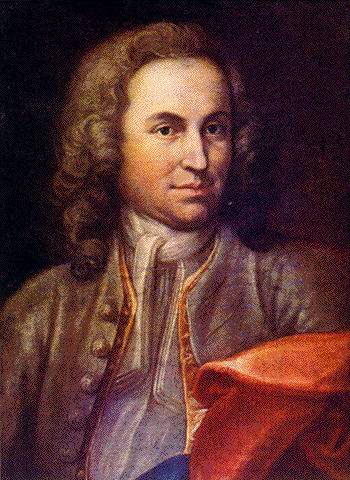 |
The small Music library.
- Musical Offering #1 is what Hofstadter calls "Crab Canon" that we
heard on the first day.
- "Bach's Strange Loop" is what the book calls the "Endlessly Rising
Canon" -- done with Shepard tones, as described near the end of the
book.
- The Musical Offering numbers are orignially from mp3.com.
For all you Bach & musically inclined readers, please send me corrections
or updates to what's here so far!
|
And also, some random images.
Schedule:
Whenever
a chapter is assigned, that includes the dialogue immediately
preceding it. So the reading for Ch. 4, which begins on page 82,
actually includes the dialogue starting before that on page 75.
The
schedule is intentionally top-heavy, so the bulk of the technical
readings are hopefully finished before midterms start in full swing.
Please read ahead if this is a concern for you.
Week 1 (4/1): Course introduction
Week 2 (4/8): Formal Systems & Intro to Meaning
Readings:
- Preface
(only in 20th anniversary edition) – just the first
~4 pages
- Introduction
– A Musico-Logical Offering
- Chapter
1 – MU puzzle
- Chapter
2 – Meaning and Form
- Chapter
3 – Figure and Ground (metaphor from the visual arts, for
mathematical knowledge)
- Chapter
4 – Consistency, Completeness, and Geometry
- Highlight:
Contracrostipunctus
Key
reading: the dialogue for Chapter 4, Contracrostipunctus. It
illustrates some very important concepts for later in the book; also,
it’s pretty nifty. [hint: there’s at least one hidden
message]
Week 3 (4/15): Recursion, Meaning, and Music
Readings:
- Chapter
5 – Recursive Structures
- Chapter
6 – Location of Meaning.
Speaker:
Maggie Johnson, on Bach’s music.
Week 4 (4/22): Logic, Numbers, and Zen
Readings:
- Chapter
7 – The Propositional Calculus (introduction to propositional
logic)
- Chapter
8 – Typographical Number Theory (Hofstadter’s formal
system)
- Chapter
9 – Mumon and Gödel (a delightful almost-tangent on
Buddhism and DNA)
- Can
read ahead: Prelude… Ant Fugue, the joint dialogue for
Chapters 10, 11
Week 5 (4/29): Holism, Reductionism, and Mind
Readings:
- Chapter
10 – Levels of Description, and Computer Systems
- Chapter
11 – Brains and Thoughts
- Chapter
12 – Minds and Thoughts
Read
the first picture for Ant Fugue several times over, it might
take a few tries to get what’s going on.
Week 6 (5/6): Finally, Gödel’s Incompleteness
Theorem
Readings:
- Chapter
13 – BlooP, FlooP, GlooP (overview of computability)
- Chapter
14 – On Formerly Undecidable Propositions (the theorem,
finally explained)
Speaker:
Maggie Johnson, über formal untscheidbare Sätze der
Principia Mathematica.
Week 7 (5/13): Implications of Incompleteness
Readings:
- Chapter
15 – Jumping Out of the System
- Chapter
16 – Self-Ref and Self-Rep
- Chapter
17 – Church, Turing, Tarski, and Others
Week 8: (5/20): Artificial Intelligence
Readings:
- Chapter
18 – AI: Retrospects
- Chapter
19 – AI: Prospects
Speaker: Terry Winograd
Week 9 (5/27): Final discussion
Reading:
- Chapter
20 – Strange Loops, or Tangled Hierarchies
Escher self-portrait & photo.
This page's background, of course, is also by Escher. |
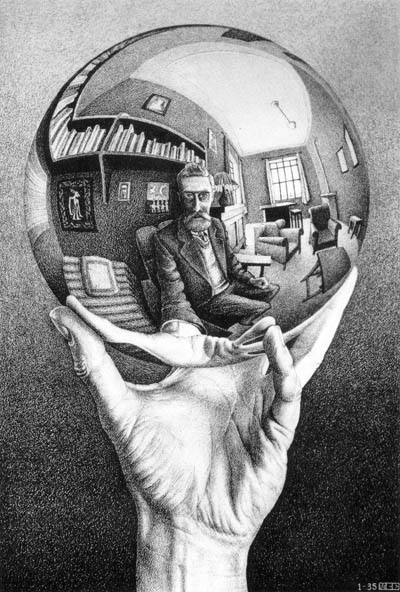 |
 |
Some Links
These have been borrowed from Sol Feferman's course
website for Gödel's Theorem, Minds and Machines.
http://www-history.mcs.st-and.ac.uk/~history/Mathematicians/Godel.html
Mini-biography of Kurt Gödel.
http://www-history.mcs.st-and.ac.uk/~history/Mathematicians/Turing.html
Mini-biography of Alan Turing.
http://www.sm.luth.se/~torkel/eget/godel.html
Gödel on the net and a sketch of the incompleteness theorems, as presented
by Torkel Franzén of Sweden.
http://plato.stanford.edu/entries/turing/
Extensive entry in the Stanford Encyclopedia of Philosophy on Turing's
work and thought, by Andrew Hodges, author of Alan Turing: The Enigma.
http://www.turing.org.uk/turing
The Alan Turing Home Page, maintained by Andrew Hodges.
http://www-csli.stanford.edu/hp/Turing1.html
Introduction to Turing machines via state diagrams, taken from Turing's
World by Jon Barwise and John Etchemendy.
http://users.ox.ac.uk/~jrlucas/index.html
Home page of J. R. Lucas, containing his paper "Minds, machines and Gödel"
arguing that Gödel's incompleteness theorem indicates minds cannot be
explained as (Turing) machines. This is the paper that Hosfstadter
introduces in Chapter
7 of GEB. Lucas' home page also contains further papers
and links on the ensuing controversy.
http://www.u.arizona.edu/~chalmers/online2.html#godel
This is on the home page of David Chalmers. He provides a truly
extensive collection of useful links on the subject of consciousness,
under the heading "Other philosophy of mind". Within that, one
group of links is devoted to Godel's theorem and AI.





